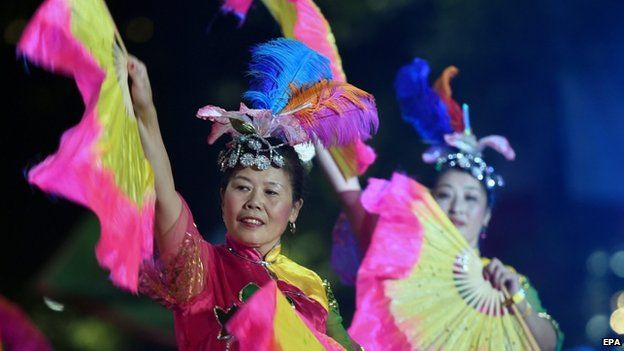China media: Lunar New Year goes global
- Published

Papers say global celebrations of the Chinese New Year reflect the country's growing prominence in the world.
The Lunar New Year, also known as The Spring Festival, is one of the most important occasions in China.
The New Year celebrations, which started on Thursday, will continue for two weeks.
According to the People's Daily, many Chinese working in countries such as Hungary, Iraq and the US are celebrating the festival with the locals and "bringing warmth to the people there".
Another article in the daily comments that the whole world is celebrating the Spring Festival, marking China's rapid rise and its influence.
"With closer Beijing-Kuala Lumpur ties… the festive mood in Malaysia is even more vibrant," writes Huang Huikang, China's ambassador to Malaysia.
The diplomat adds that Chinese culture will continue to spread to "every corner of the world" as the country's influence grows.
Echoing similar views, the Beijing Youth Daily states that the Spring Festival has been "internationalised".
"It is no longer an occasion celebrated by the Chinese. It is slowing becoming a global festive season," notes the commentary.
The commentary adds that China's economic development and stronger national might are the "reasons behind the internationalisation of China's Spring Festival".
"The fact that many countries are joining in the celebrations shows that China's soft power is continuing to influence the world," state-run China News Service adds.
Festive bribe
Meanwhile, papers note that the practice of giving "bribes" in red envelopes to officials has reduced this year.
Red envelopes traditionally contain money and are given as gifts during the Chinese New Year and other major social events like weddings and birthdays.
Chinese authorities had earlier announced a "zero tolerance" policy towards "red envelope corruption" and warned officials against collecting bribes during the holiday season, according to reports.
The official Xinhua News Agency observes that most people are only exchanging red envelopes with relatives.
"People are now handing out the red envelope as a form of goodwill and no longer as an obligated gift [to local officials]," notes the state-run agency.
Welcoming the trend, the Beijing News believes that officials are mindful of the government's ongoing anti-corruption effort.
"People's trust in the central government's determination in fighting corruption has increased," says the paper, adding that the red envelope has "returned" to its original purpose of promoting family bonding.
Electronic red envelopes
However, some papers are worried that young people are becoming too "obsessed" with electronic red envelopes.
"The traditional festive scene of children clad in red, knelt down, kowtowing to their elders, who hand them red envelopes containing 'lucky money' for Spring Festival is now a rarity," the Xinhua observes.
According to China Daily, more than 1 billion e-red envelopes were sent out on Lunar New Year's Eve via WeChat, an instant messaging app.
"Observers have voiced fears of younger people becoming so obsessed with sending and receiving WeChat red envelopes that they look at their phones continuously and forget to talk to their families," notes the daily.
BBC Monitoring reports and analyses news from TV, radio, web and print media around the world. You can follow BBC Monitoring on Twitter and Facebook.